
Guests
- Lee Gelerntdeputy director of the ACLU Immigrants’ Rights Project and an adjunct professor at Columbia Law School.
A federal judge in New Hampshire has issued a nationwide injunction against President Trump’s executive order ending birthright citizenship for children born in the United States since February 20. In a class-action lawsuit filed on behalf of immigrant parents, the ACLU argued that the order would leave children born to undocumented parents “effectively stateless.” We speak to ACLU attorney Lee Gelernt about the case, which he calls “cruel” and without merit, as well as new evidence that the Trump administration is lying about its power over people it has expelled to the Salvadoran mega-prison CECOT.
Transcript
AMY GOODMAN: This is Democracy Now!, democracynow.org. I’m Amy Goodman.
A federal judge in New Hampshire has issued a new nationwide injunction against President Trump’s executive order ending birthright citizenship. Thursday’s ruling came in response to a class-action lawsuit filed by the ACLU and other groups on behalf of immigrant parents and infants born since February 20th, when President Trump signed the executive order. The lawsuit was filed just hours after the Supreme Court’s ruling last month on birthright citizenship which curtailed the power of judges to issue nationwide injunctions.
Thursday’s ruling was issued by Judge Joseph Laplante, who was appointed to the bench by Republican President George W. Bush. Judge Laplante said during the hearing, quote, “The preliminary injunction is just not a close call to the court. The deprivation of U.S. citizenship and an abrupt change of policy that was longstanding … that’s irreparable harm,” he said.
The ACLU lawsuit argued Trump’s order would result in children born to undocumented parents being rendered effectively stateless.
To talk more about this case and more, we’re joined by Lee Gelernt, deputy director of the ACLU Immigrants’ Rights Project.
Lee, thanks so much for being with us. Talk about the significance of this ruling and how you got around the Supreme Court.
LEE GELERNT: Yeah, this is enormously important, because if these children lose citizenship, not only is that a precious right, but various benefits, lifesaving-type benefits, food, medical care, could have been lost to them. So we are extremely pleased that the court has issued this injunction, and it’s nationwide.
So, what the Supreme Court said in the birthrights case that went up there, the CASA case, as you mentioned, was that plaintiffs, without a class action, couldn’t necessarily get a nationwide injunction. It didn’t rule it out completely, but it put its thumb on the scale against that and said the proper way to do it is to bring a class action and have the district court decide that a class action is proper. And so that’s what we did. We brought a class action showing that this kind of relief is nationwide necessary, and the judge agreed. So, we feel like this is the way the Supreme Court told us to do it, and that’s what we did.
AMY GOODMAN: So, talk about President Trump’s response and what he’s saying about the 14th Amendment and the idea that birthright citizenship only applied to the children of slaves.
LEE GELERNT: Yeah, so, we obviously think that is patently wrong. The Supreme Court has said it’s wrong. There’s multiple cases from the Supreme Court, dating back more than a century, saying that the 14th Amendment applied to undocumented immigrants. And so, the lower courts are properly following that. The historical research shows that it wasn’t meant just to protect slaves. So we think we’re absolutely on the right side of this. I think every president has adhered to what the 14th Amendment says and what, more importantly, the Supreme Court says the 14th Amendment says.
So, we do not think there’s any merit to what the government’s arguing, and it’s a cruel policy. It’s fundamentally altering the nature of how America has viewed people born in this country. And so, we’re hopeful we’ll prevail. So far, every court that’s looked at this has said that we are right, that the 14th Amendment doesn’t just protect us — didn’t just protect slaves, it protects undocumented immigrants, as well, and provides birthright citizenship to them. So, we’ll see what the Supreme Court does. Obviously, it’ll go back to the Supreme Court. The Supreme Court will have to decide whether to overrule their precedents. We hope that they will not.
AMY GOODMAN: But explain what it would mean if Trump got his way.
LEE GELERNT: Yeah, the consequences would be devastating. I mean, even going forward, right? So, children born on U.S. soil would no longer be citizens. They could be stateless. They would be denied basic medical care. You know, if you go back through history, you look at how many children this would have affected, and some of the most famous people, the people who contributed to America, I think it’s hard to even understand the implications. But what it would mean, you know, quickly, is, you’re born on U.S. soil, you used to be a U.S. citizen. That used to be a hallmark of America. And then, all of a sudden, you wouldn’t be a citizen. It’s not clear where you’d be a citizen. I don’t think it — children could be stateless. The consequences would be devastating.
AMY GOODMAN: Lee, I want to ask you about another case you’re involved in. The government of El Salvador has admitted to U.N. investigators that the Trump administration controls the fate of nearly 140 Venezuelan immigrants who were transferred from the U.S. to the notorious CECOT mega-prison.
LEE GELERNT: Right.
AMY GOODMAN: The revelations contradict claims by Trump officials and DOJ lawyers who have repeatedly said they don’t have the jurisdiction or power to facilitate the return of the immigrants who were renditioned to El Salvador from the U.S. without due process. In the document, the Salvadoran government states, quote, “The jurisdiction and legal responsibility for these persons lie exclusively with the competent foreign authorities.” Talk about how you got this document. And does it mean that Justice Department lawyers have repeatedly lied in court?
LEE GELERNT: Yeah, I’m glad you asked about that, because I think this is a remarkable turn of events. So, just first of all, how we got the U.N. document. Our friends at Human Rights First a long time ago wrote to the U.N. on behalf of a few families, asking what’s happened to their families. The U.N. sent — as they’re supposed to, sent the inquiry to the El Salvador government. El Salvador responded fairly quickly to the U.N., saying, “We are not responsible for these detainees. This is the responsibility of the state that sent us these detainees.” And so, it was, you know, a sort of explosive document, to say the least, because the United States government had been repeatedly telling courts, “We have no — we can’t do anything about these individuals at CECOT. It’s solely El Salvador’s responsibility.”
What’s remarkable — and so, finally, the document was sent the families. The families gave it to us. But what’s remarkable is that the United States did not give us the document or give us the court — give the court the document. We specifically asked for all those types of documents in what’s called discovery. They admitted that document. Obviously, it was relevant. I mean, more than relevant, it’s explosive. So, we’ll have to see. We’ve told the court about it now. We’re going to have to see what other documents were not turned over to us.
But it directly contradicts what the United States has been saying. I mean, as you mentioned, that night of March 15th, they sent more than a hundred men, maybe over 200 men, without any due process to this prison. They may languish there for the rest of their lives in one of the most notorious places in the world. The United States is saying, “Well, OK, maybe there was a due process violation, but what do you want us to do about it? El Salvador controls everything.” Now we all of a sudden find this document where El Salvador is saying the opposite. We’ll see how the U.S. government tries to whitewash it. But I suspect there are many other documents out there that are relevant, and so we will begin asking for those documents.
AMY GOODMAN: So, essentially, I mean, what’s very clear — right? — is that Bukele, who describes himself as “the coolest dictator in the world,” is getting paid millions of dollars to incarcerate these men, so the U.S. has a direct relationship. If it took away the money, what would happen?
LEE GELERNT: Yeah, so, I’m glad you brought that up, because I just want to make clear that this document doesn’t change things in our mind. It simply confirms what we already knew and what I think everyone knows, is, of course, the U.S. controls this. As you said, the U.S. is paying for these detainees to be there. El Salvador has no relationship to these Venezuelan men. These are not Salvadoran citizens. They’re holding them there as if a private prison. And they’re getting paid for it. If the U.S. took the money away or said, “We need these detainees back, because a federal court has said that due process was violated,” of course we could get them back. So, we knew that all the time. And I think everyone sort of understands that. The importance of this document is it confirms El Salvador is saying it. But you’re absolutely right: We are paying as if we were paying a private prison to hold these individuals.
AMY GOODMAN: Well, I want to thank you so much for being with us, Lee Gelernt, deputy director of the ACLU Immigrants’ Rights Project. To see our interviews about some of these men, like the Venezuelan hairdresser Andry Hernández Romero, go to democracynow.org.
Coming up, U.N. High Commissioner for Human Rights Volker Türk.
[break]
AMY GOODMAN: “Nunca Más,” “Never Again,” by La Santa Cecilia, in our Democracy Now! studio.

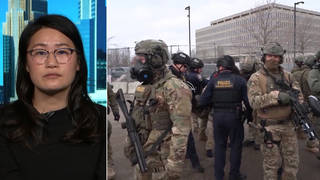
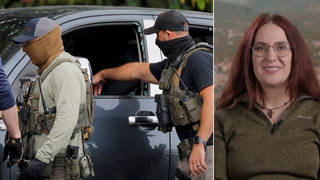
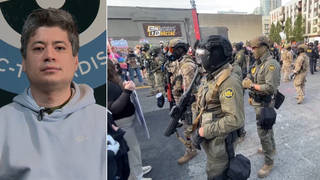
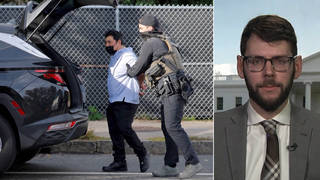





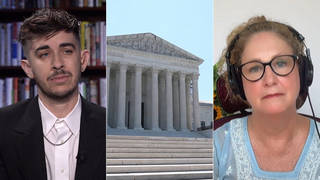

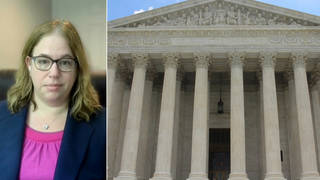
Media Options